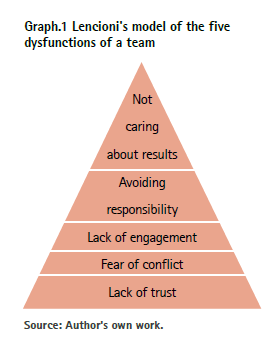How to develop trust in the manager - employee relationship
- What does and does not constitute trust in a manger-employee relationship?
- What makes it difficult to build trust in a team?
- How can we develop trust in the manager-employee relationship?

Successful management is based on subordinates’ trust. However, unlike the rights and obligations we receive when we take up a new job, we have to earn trust ourselves.
Let’s start with what trust means in a team. Contrary to popular belief, trust isn’t about team members’ ability to predict each other’s behaviour. People who have been working together for a long time learn to predict what others will say and do based on the behaviours they observe. Someone may say: “I know Mark will get upset when I talk about his tempter,” but that’s not trust.
According to Patrick Lencioni, trust is all about openness. Employees who trust each other are open to each other, and are not afraid to tell the truth about themselves or admit their mistakes, which means that they don’t engage in games that waste time and energy and prevent them from achieving common goals.
Example
The president of a family company that distributes car parts changed after 30 years: the father retired and his son took over the business. Under the new leadership, the company soon found itself in a downward spiral: turnover began to decline, key clients left, and staff turnover was high. The new president, a brilliant and intelligent man, decided to see what was going on and conducted a 360-degree survey of his employees.
After collecting the results, he called a meeting and, with the results in his hand, addressed the team:
“The answers to the fifth question suggest that I am not supporting my team well enough. What do you think?”.
There was an awkward silence as the crowd began to reassure the president that this was a mistake and that he was actually supporting them better than his predecessor. At one point, one of the managers summoned up the courage and in an almost apologetic tone said:
“I guess there’s some point to that. I think you might find some more time for us, so that we could come to you and ask you about various issues. Then the information that circulates around the company would be more consistent.”
After an embarrassing pause, another manager said to the president:
“I don’t agree. I think that any one of us could come to you with anything, and you will always listen to us.”
The rest nodded silently, and the lonely daredevil began to wonder why he stepped out at all.
What does this story show? Subordinates learned that openness does not pay off. They pretended that everything was fine and only solved those problems that negatively affected the efficiency of their own departments, which quickly led to even more disaster and lost profit.
What exactly does a lack of trust lead to?
Let’s look at what Patrick Lencioni proposes to develop trust based on openness.
When there’s a lack of trust in the team, employees are afraid to discuss their own weaknesses, mistakes, fears, and behaviours, which quickly leads to a loss of sincere communication and the fear of constructive conflict. On the other hand, when you’re afraid to discuss issues that are key to the organisation’s success and to disagree with others in order to find the best solutions, you cease to be involved in joint decisions. It’s difficult to make decisions when some people aren’t sure that all doubts and ideas have been discussed and that nothing has been swept under the rug. When some people don’t accept the adopted solution, responsibility falls on the leader and employees stop attaching importance to the results of their work.
The difficulty in building trust in the manager-employee relationship results from two factors:
First, to build trust, the manager has to be aware of their own limitations and ready to see the situation in the company for what it is. It may be similar to the situation described in the example. However, it’s much better to deal with that than to pretend it’s something that it’s not. Only by being aware of the problem can we address it and avoid the unrealistic expectations that lead to frustration and conflict.
The second difficulty is that adults tend to protect themselves, making it hard for them to take the risk of opening themselves up for others’ benefit. This example shows that honesty is rarely rewarded. Moreover, in a world where we spend so much time trying to get to the top, it’s very difficult to admit our mistakes and ask for help, as this often mistaken for incompetence. This approach teaches us to care about ourselves first, rather than others.
So how can you develop trust in the manager-employee relationship without harming your own organisation?
Wykorzystałeś swój limit bezpłatnych treści
Pozostałe 54% artykułu dostępne jest dla zalogowanych użytkowników portalu. Zaloguj się, wybierz plan abonamentowy albo kup dostęp do artykułu/dokumentu.







 Zaloguj się
Zaloguj się








